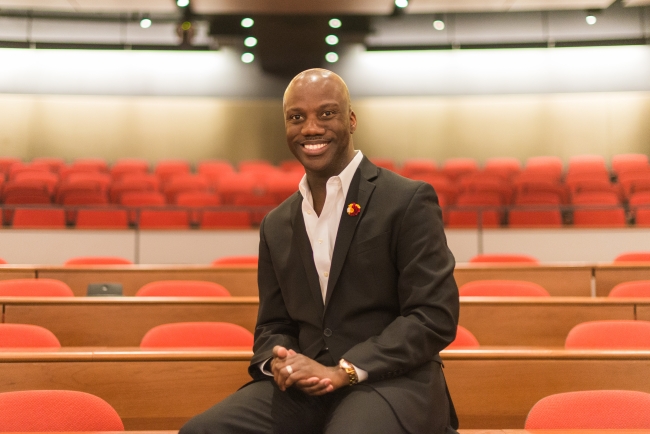You have /5 articles left.
Sign up for a free account or log in.

Shaun Harper
Rashiid Coleman
When campus protests against racism were at their peak in November 2015, the University of Pennsylvania’s Center for the Study of Race and Equity in Education was inundated with phone calls from campus leaders asking for help.
“In the immediate aftermath of the protests at Mizzou and Yale, there were days when the phones were ringing almost nonstop,” Shaun Harper, the center’s executive director, said. “We were getting so many calls from leaders asking, ‘Can you come and do a climate study?’ Spending four days on a campus interviewing hundreds of people is intense. It was getting to the point that we were exceeding our capacity.”
Harper and the University of Southern California are now aiming to both simplify the process of conducting campus climate surveys while also significantly expanding the scope of such research. This year, Harper and USC will develop a new nationwide survey to administer to hundreds of institutions to, as he described it, “gather intel on critically important questions that are keeping university leaders wide-awake at night.”
The survey will be one of several projects organized by USC’s new Center on Race and Equity, which Harper will be leaving the University of Pennsylvania to lead.
As the Penn Center’s founder and executive director, Harper became a prominent researcher on issues concerning race in higher education -- authoring studies on the mental health toll on black students who respond to and resist stereotypes, the low graduation rates of black college athletes, and the ways that high-achieving African-American men who made it to college were able to do so. The University of Pennsylvania declined to comment on whether the Penn Center would continue after Harper leaves.
When Harper begins his work at USC, he will bring with him several of the Penn Center’s staff members and three of its most prominent initiatives: Penn Equity Institutes, a five-week virtual course for administrators and faculty members; Penn Summits, a one- to three-day professional development event; and its in-depth and highly sought after climate surveys. Since the Penn Center’s creation in 2011, Harper and his staff have interviewed more than 10,000 students at more than 40 colleges and universities.
Harper said the new USC survey, called the National Assessment of Collegiate Campus Climates, will focus on students of color, LGBT students, students with disabilities, women and religious minorities. The university envisions “hundreds of universities” participating in the survey each year, similar to the annual National Survey of Student Engagement, which includes responses from more than 300,000 students at more than 550 institutions.
The survey will be piloted twice this year before going nationwide in 2018.
“We will continue what we started at Penn, but we will have significantly more full-time employees and the new center will allow us a broader reach,” Harper said. “I think we will be in a better position to do our best work with an increase of staffing, and because will we have a broader voice and mission. Our current center focused entirely on race and equity in education, specifically, but I’ve come to understand that racial inequity in education is not always fully explained by just what happens in education. There are a lot of these broader social and structural forces that help to shape educational outcomes and experiences.”
Along with the additional full-time staff members, the USC Center will bring together more than 40 professors from across the university’s 18 schools to collaborate on research. The center itself, Harper said, will act as an “intellectual clubhouse” for faculty members who specialize in studying racial equity in health, law, criminal justice and housing, among other areas. They will be assisted by at least 30 Ph.D. students.
The university declined to say how much the new center will cost, but Michael Quick, USC’s provost, said it will be well funded. The center will be housed in the university’s Rossier School of Education, where Harper will be professor of urban leadership. Harper was previously an assistant professor at the school from 2003 to 2005.
“Our mission is to improve learning in urban education,” Karen Gallagher, dean of the Rossier School, said. “The hope is that the center will help us begin to look at our own practices and also have national impact.”
Quick said the center’s research will help both USC and other institutions tackle what he called “those wicked problems.”
“Those are the problems that require you to have expertise in so many areas to really figure out,” Quick said. “Race and equity is a wicked problem. People talk about equity and inclusion and opportunity and access. All those are great things, and we need to do something about them, but we need to be scholarly about it. We need to figure out what the data tell us. The center will serve as a hub for that.”



